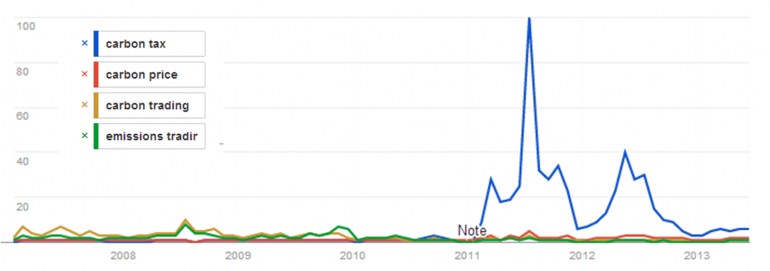How Julia became Ju-Liar and sank the carbon price
T - A - X there are few other words that elicit such a strong adverse reaction from the electorate.
And in the end those three letters after the word ‘carbon’, instead of the three words ‘emissions trading scheme’ acted to hang Gillard and her government, and ultimately led to yesterday's repeal of a decade of hard work developing Australia’s carbon emissions trading scheme.
After announcing with the Greens on February 24, 2011 that they would be negotiating to develop an emissions cap and trade scheme with a fixed price for the first three years, Gillard made a fatal mistake in an interview that day on the ABC’s 7.30 Report,
HEATHER EWART: With this carbon tax - you do concede it's a carbon tax, do you not?
JULIA GILLARD: Oh, look, I'm happy to use the word tax, Heather. I understand some silly little collateral debate has broken out today. I mean, how ridiculous. This is a market-based mechanism to price carbon.
At the time Gillard made those remarks I remember thinking little of it. Being a policy wonk who had worked on emission reduction policy for many years, I knew that when you boiled down the economics of it all, the choice of carbon tax or trading scheme didn't really matter, they both acted in pretty much the same way.
But it made a huge difference politically.
A few months earlier during the election campaign Gillard had made a promise that did suggest an important difference between a carbon tax and an emissions cap and trade scheme. In an interview with Channel 10, she had said, "There will be no carbon tax under the government I lead". She then subsequently said she would work towards implementation of a ‘cap on pollution’ – in policy wonk speak: an emissions cap and trade scheme. And on other occasions during the election campaign she also stated that she felt putting a ‘price on carbon’ was the right thing to do, and if elected she would work towards implementation of an ‘emissions trading scheme’, while avoiding mentioning a ‘carbon tax’.
Former National Editor of the 7.30 Report Philip Chubb, who has done a fantastic job charting the conduct of climate policy under Rudd and Gillard in his book Power Failure, concludes this was the point at which things went pear shaped for Gillard.
A few days before her 7.30 Report interview, Newspoll put Labor’s primary vote at 36 per cent and the Greens at 13 per cent, ahead of the Coalition on 41 per cent. But Labor’s primary vote dived subsequently.
The following month's Newspoll on 4-6 March had Labor’s primary vote at 32 per cent, with the Coalition jumping to 45 per cent. Then by July, Labor’s primary vote fell to disastrous levels below the 30 per cent mark - reaching 27 per cent versus the Coalition’s 49 per cent.
In terms of Gillard’s own personal popularity just before that fateful 7.30 Report interview, 50 per cent were satisfied with how she was doing her job and 39 per cent dissatisfied, according to Newspoll.
Just two weeks after the prior poll, there was a complete reversal. Newspoll showed 39 per cent were satisfied and 51 per cent dissatisfied. By July 10, dissatisfaction was at 59 per cent, with just 30 per cent satisfied with how she was doing her job.
What suggests this slide was very much down to an issue of language rather than substance, was that in September 2010 it had already been announced that Labor would aim to implement a price on carbon. This was a condition of the Greens giving their support to Labor to form a minority government. At the time it wasn’t described as a carbon tax, and there was no clear drop away in the polls.
Google search statistics (charted below) provide further evidence that her 7.30 Report interview marked a decisive shift in the language of the debate and people’s interest in carbon pricing policy.
Tony Abbott had been trying to label an emissions trading scheme as a carbon tax from the time he was appointed leader of the Liberal Party in December 2009, but he spectacularly failed to get people to think in those terms, if Google search statistics are any guide.
It was precisely in February 2011 that ‘carbon tax’ began to spike in Google searches above the other terms for describing a price on carbon.
Relative frequency that Australians have searched in Google for the terms ‘carbon tax’ (blue), ‘carbon price’ (red), ‘carbon trading’ (yellow), and ‘emissions trading’ (green).

Source: Google Trends. Note: Chart is normalised against a scale of 100 where 100 equals the point at which searches for the term ‘carbon tax’ peaked.
Craig Emerson, trade minister in the Gillard government, explains in Chubb’s book Power Failure, why accepting the description of the scheme as a ‘carbon tax’ was so important.
He told Chubb,
Because she said there will be no carbon tax and then, when asked, ‘is this a carbon tax?’, she said, ‘Yes, it is’. That is an admission of lying. In logical terms it wasn’t, but in political terms it was. That’s the message that people got.
Did it make a difference? They [the Coalition] would have depicted it as a tax anyway, but they wouldn’t have been so easily able to depict it as a broken promise.”
















